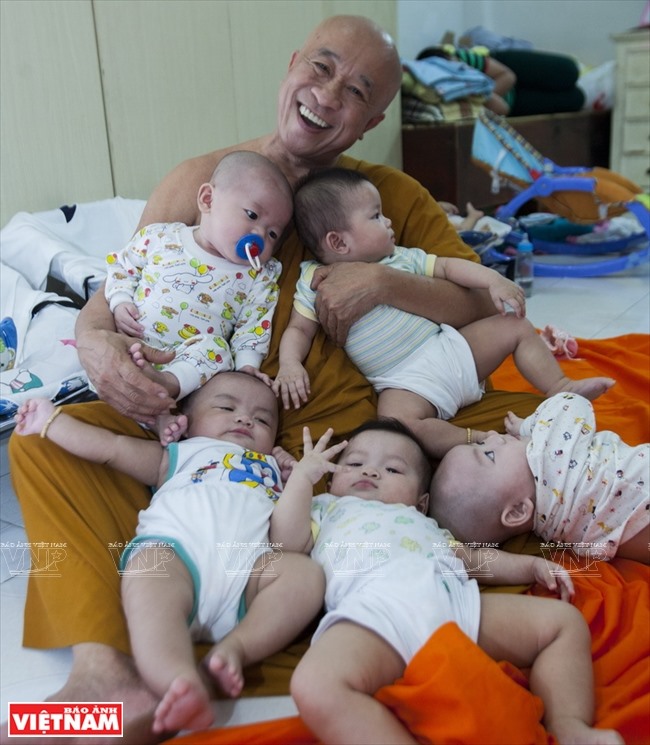 Society
Society

" />Many infants have been abandoned at Kỳ Quang II Pagoda in HCM City’s Gò Vấp District where they are taken care of and provided nutrition suitable with their age and disability.
 |
| A bunch of babies taken care of at Kỳ Quang II Pagoda in HCM City’s Gò Vấp District. — VNP/VNS Photo |
HCM CITY — Many infants have been abandoned at Kỳ Quang II Pagoda in HCM City’s Gò Vấp District which is also home to children with disabilities.
At the pagoda, the disadvantaged children are taken care of and provided with nutrition suitabley by the pagoda’s monks and volunteers working as caregivers. They are also brought to schools under the help of the district’s education division.
Several of them, who have difficulty learning with other children at schools because of their disability, are taught at the pagoda and receive physical therapy every day.
The pagoda’s staff also provides occupation consulting and vocational training to children with visual impairment. Last year the pagoda co-operated with the district’s Traditional Medicine Association and HCM City Traditional Medicine Institute to open a short-term training course on massage for young people with visual impairment to help provide jobs for them.
Kỳ Quang II Pagoda is one of eight Buddhist social welfare establishments providing social protection and assistance to disadvantaged people in the city , according to a Department of Labour, Invalids, and Social Affairs’ report.
A report by the Việt Nam Fatherland Front (VFF) Central Committee showed that there are a total of 113 religious establishments home to 11,800 orphans, children with disabilities and old people in the whole country.
Providing academic training
Moreover, religious institutions have contributed to helping poor children access education.
Việt Nam Buddhist Sangha in the Mekong Delta province of Kiên Giang, for instance, set up Phật Quang Pagoda for raising and teaching poor children, orphans and homeless children in the province under the approval of the provincial People’s Committee.
The first academic year for 100 children from grade 1-3 started at the pagoda in 2002. These children were taught many subjects, such as Vietnamese, English, computer science, music and living skills at the pagoda.
As of 2015-16, 198 children from kindergarten to high school level were taught at the pagoda, the pagoda’s Venerable Thích Minh Mẫn said.
Most of children are from poor families. Some were abandoned after living with their grandparents whose health was not good whilst others come from families whose parents were divorced, Mẫn said.
“Going to school for these children is an abstract dream,” he said, adding that because they lack money, their living environment leads to inconsistant physical and mental development.
A proper teaching methodology for them is very necessary to help acheive comprehensive development like other children, he said.
They are taught not only academics but also ethics, he said.
Their parents also are guided in ways to create a healthy living environment to co-operate with the pagoda to teach and develop a good personality for the children, he added.
Vocational training
Speaking at a workshop honouring contributions of religious social welfare and vocational training establishments last week in HCM City, Lê Bá Trình, the VFF Central Committee’s deputy head, said that other religious establishments have opened vocational training facilities to poor young people.
The Bishop of Xuân Lộc in the southeastern province of Đồng Nai, for example, has opened Hòa Bình Vocational Training School teaching electrical engineering, IT, tourism, accounting, automotive engineering and other subjects since 2008.
Dr Trịnh Thanh Toản, the school’s deputy head, said that the number of students has increased year-by-year, from 375 students in the 2012-13 academic year to 1,133 in 2016-17.
The school’s graduates all have job and meet the demands of companies, Toản said.
Minister of Labour, Invalids and Social Affairs Đào Ngọc Dung highly appreciated and honoured their contributions to improve the physical and mental life of disadvantaged people in the country and human resource training for the country.
Chairman of Việt Nam Fatherland Front (VFF) Central Committee Nguyễn Thiện Nhân said that religious institutions should continue their contributions.
Nhân called on authorities and relevant agencies including labour sectors and VFF in provinces and cities to guide and create more favourable conditions for such establishments to operate.
“They should have more policies to help children at these establishments to get benefits such as exemption of tuition fees or free provision of health insurance cards in accoradance with government regulations,” he added.
Challenges
According to Trình, many religious social welfare establishments have invested in building standard facilities to ensure raising and taking care of children and other disadvantaged people.
However, several of them have limited facilities, he added.
“Staff and volunteers working as social workers at these establishments are very enthusiastic, friendly and share heart-felt love for these disadvantaged people,” he said, however, many of them are not trained with professional knowledge and skills which are necessary for social work.
Labour divisions in provinces and cities have provided training courses to staff and volunteers, he added.
Vijaya Ratnam-Raman, acting chief of the child protection programme at UNICEF Việt Nam, said that these challenges are not unique to Việt Nam.
Indeed, residential care of children all over the world is a very complicated issue that faces many challenges to ensure that the rights of children are realised, he added.
UNICEF strongly recommends that the government in co-operation with the Việt Nam Fatherland Front and religious organisations across Việt Nam learn from the failures of other countries and do all that is within its power to ensure the children’s rights, he said.
“They should support the institutions to improve the quality of their care staff, and their ability to have qualified religious social workers in each care setting is critical to ensure the needs of children are timely identified and addressed,” he added. — VNS